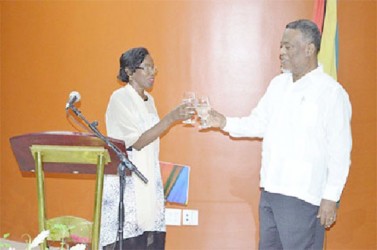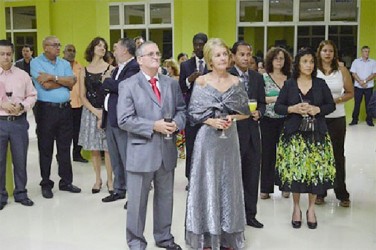Prime Minister Samuel Hinds has lauded relations between Guyana and Venezuela and called for the expedited settlement of the decades-old border controversy between the two countries.
In recent weeks Georgetown has ratcheted up the pressure on Caracas to begin talks on maritime delimitation which had been promised this year. Last year, a research vessel in Guyana’s waters was impounded by the Venezuelan navy and this led to a standoff between the two countries.
Hinds spoke at a cocktail reception, held at the New Thriving Events Centre on Saturday evening, to mark the Bolivarian Republic’s 203rd independence anniversary, a report from the Government Information agency (GINA) said. The prime minister said the observance serves as a historic reminder of the fulfilment of the dreams and aspirations of regional hero Simon Bolivar for an independent nation.
“His aspiration has also been fulfilled through the formation of the Union of South American Nations (UNASUR) and the Community of Latin American and Caribbean States (CELAC),” the prime minister said. Both Guyana and Venezuela have been able to take advantage of the opportunities stemming from these integration mechanisms to promote the common interests of the South American continent and the wider Latin American and Caribbean region. Guyana’s joining UNASUR and CELAC shows its support for the preservation of the democratic process of Venezuela. “I wish to reiterate that support tonight; the commitment to the principle of comity among nations, non-intervention in the internal affairs of sovereign states promotion of democracy and the peaceful coexistence of all nations remain the corners stones of Guyana’s foreign policy,” he said.

Government has also focused on maintaining stabile bilateral relations. “We have been able to maintain a viable and mutual beneficial agreement for the trade of rice and anticipate that in the near future that our trade relations will expand to include non-traditional products.” A direct air link between the countries, via Conviasa Airline, is expected to foster more people-to-people contact and trade.
Meanwhile, Guyana continues to benefit from the PetroCaribe agreement with the provision of credit on preferential terms for the purchase of fuel and petroleum products. However, “While we strive to advance our functional cooperation programme, we cannot sweep aside existing irritants that threaten the stability of our relations. Guyana will continue to pursue with Venezuela a peaceful resolution of the controversy over the claim by Venezuela that the 1899 arbitral award which settled the land boundary between our two countries is null and void,” Hinds said. Government hopes that the process can be expedited, he added, noting that “These unresolved issues continue to hinder our ability to freely develop our resources in the interest in the people of Guyana and restrict us from making a greater contribution to the welfare of the people of wider Latin America and Caribbean region.” To this end, Guyana is prepared to work with Venezuela in a spirit of camaraderie and good faith.
Meanwhile, Venezuelan Ambassador to Guyana, Reina Arratia Diaz in her message said the commemoration is as a result of struggles, battles, and victories, which continue in her country today with the aim of achieving the dream of its liberators and the supreme leader of the Revolutionary process, Hugo Chavez, “Especially today, one year and four months since his physical parting; a man that gave everything to have a free and democratic homeland, without interference from foreign powers.”

She further said that the revolutionary government of President Nicolas Maduro continuously faces media attacks at the national and international levels, from an “internal oligarchy and external powers who want to overthrow a democratic government, legitimately constituted and elected by the majority of Venezuelan men and women….Together we will fight to defend the achievements made, Guyana and Venezuela, share their commitment to respect the principles of international law, which allow both countries to coincide in the frameworks of regional integration mechanisms that are sustained in the self determination of the people; equality, mutual respect, solidarity, cooperation and rejection of intervention from foreign powers in our internal affairs.”
According to the ambassador, it is within these mechanisms that PetroCaribe, UNASUR, and CELAC, in which both countries and others from the Region work to consolidate Latin American and Caribbean unity. Regarding bilateral relations with Guyana, Diaz said the two countries have signed a series of agreements on economic, social, political and cultural matters which have enabled them to advance in their construction and development.
“The validity and efficiency of these agreements are the clear guarantee of our co-existence as neighbouring countries and friends,” she said. These relations are also a demonstration of the progress of the commercial activities between Venezuela and Guyana which has materialised with the rice agreement and the supply of oil under the framework of the PetroCaribe. “This interest in the commercial aspect has been strengthened with the launching at the beginning of the year, of the Georgetown/Venezuela air connection through Conviasa Airline,” Diaz said.
Further, the ambassador said that Guyana’s expression of solidarity has heartened the Venezuelan people, especially in very sensitive times such as the memorial events marking the first anniversary of Chavez’s death. “Finally I wish to highlight the actions that both countries have consolidated in matters of education, cultural and sport cooperation recently with the participation of 33 Guyanese athletes at the Third South American Beach Games in Vargas State, last May,” she said.





